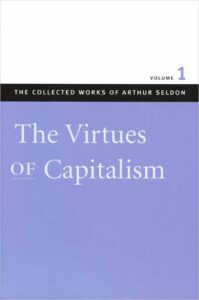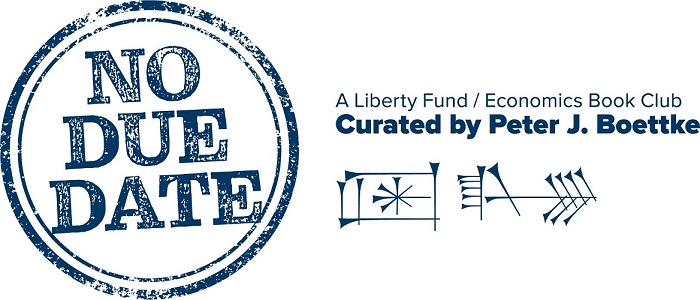People often look at my collection of Liberty Fund books and ask me whether I’ve read them all. I laugh. I wish I could say I’d read all of just the economics titles! (I am a firm believer in the art of tsundoku…)

So I was delighted when Pete Boettke chose Arthur Seldon’s under-appreciated The Virtues of Capitalism as our December selection for our No Due Date book club. I was excited to dig into one of those titles I had not yet read. And I’m very glad I did.
The history of Seldon’s conversion from socialism to capitalism and the history of his work with the Institute of Economic Affairs is certainly interesting. But Pete really got my attention when he said he wished every economic educator would read “Corrigible Capitalism, Incorrigible Socialism.”
When I asked him why, Pete said it was because of the way Seldon set the essay up. I think he’s right, and I think there are lessons to be learned for we free marketeers. Seldon calls the piece a celebration of capitalism, rather than a defense, and that’s a significant distinction for him.
Seldom admits right up front that capitalism isn’t perfect; indeed he agrees that there are some “evils” inherent in capitalism, including income inequality, the tendency toward monopoly, worker alienation, and externalities. However, contrary to the ills of socialism, all of these are remedial. The greatest weaknesses of the state economy- ignorance, inefficiency, social conflict, [also] monopoly, corruption, and coercion- are inherent in the system and cannot be solved. This is very different than the defenses of capitalism we often hear, whether based on efficiency or moral claims. Leading with defects is a bold choice. (Don’t worry, he also lays out the benefits of capitalism…) I suspect it’s also a strategy that might be more effective in the long run.
I’ll leave you to explore the details yourself. I’ll end by sharing the questions I asked Pete about Seldon’s book in our Virtual Salon. I’d love to hear how you would answer these, and look forward to seeing your responses in the Comments.
P.S. Did I mention- tomorrow is the last day to save on an annual subscription to No Due Date. This month, we’re reading Viktor Frankl’s Man’s Search for Meaning, and EconTalk host Russ Roberts will join our salon at the end of the month. Why not subscribe and join us?
1- What lessons for changing the climate of public opinion should we take from Seldon? Should we even assume the lessons he offers are correct, given that the essay was written at the dawn of the Reagan-Thatcher era. How does Seldon’s approach look from the vantage point of 2024?
2- Seldon noted that the move of intellectuals from support for the state economy versus free markets was “historically remarkable.” Again, from the vantage point of today, should we now consider this an historical anomaly instead?
3- Are the criteria Seldon offers for judging the efficacy of free markets (choice, convenience, respect for individual idiosyncrasy) still appropriate? If not, what should we use instead?
4- One of Seldon’s most compelling points is that a major flaw of the state economy is its tendency toward social conflict. Capitalism, according to Seldon, mitigates conflict. To what extent do you agree, and how well does this argument play today?


READER COMMENTS
David Seltzer
Jan 12 2024 at 3:46pm
Amy, per question 4: I think free market capitalism between and among agents mitigates conflict because those arrangements are voluntary. By contrast, as an example, Affirmative Action, per Kennedy and Jonson executive orders, is coercive and has fomented social conflict. SCOTUS ruled AA in college admissions is unconstitutional.
Amy WIllis
Jan 13 2024 at 11:00am
@David, I certainly agree with that. The state economy (to use Seldon’s terms) necessarily relies on coercion, even if a given individual is amenable to a particular action.
Thomas L Hutcheson
Jan 13 2024 at 6:42am
Seldon admits right up front that capitalism isn’t perfect; indeed he agrees that there are some “evils” inherent in capitalism, including income inequality, the tendency toward monopoly, worker alienation, and externalities. However, contrary to the ills of socialism, all of these are remedial.
This is a pretty conventional set of beliefs among mainstream economists (except they generally don’t even THINK about socialism) 🙂
Richard W Fulmer
Jan 13 2024 at 11:39am
Regarding question 2, I do think that the period of intellectual support for free markets was an anomaly. Intellectuals have a vested interest in social and economic arrangements that require direction by intellectuals. As Upton Sinclair quipped, “It is difficult to get a man to understand something when his salary depends upon his not understanding it.”
Comments are closed.